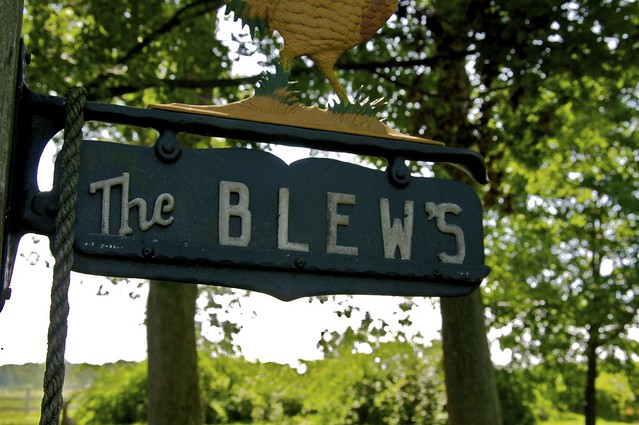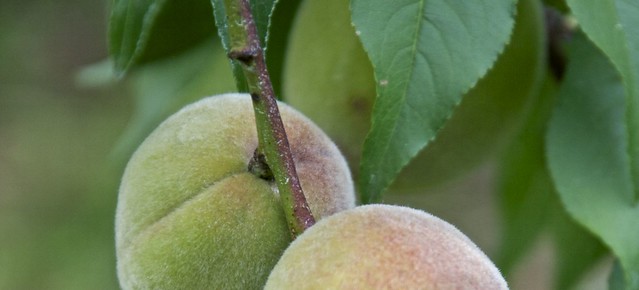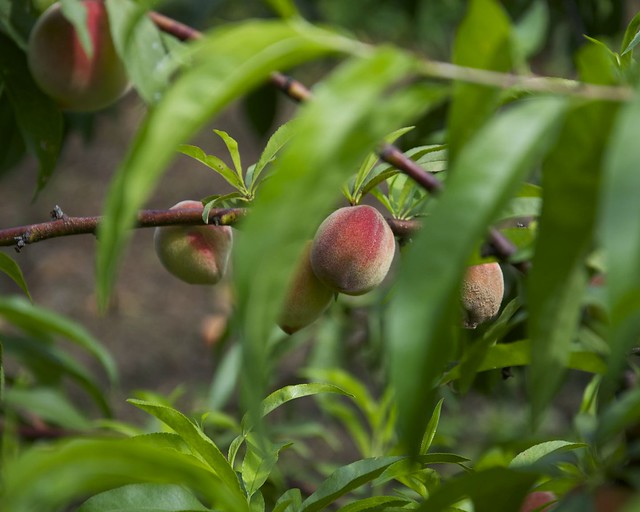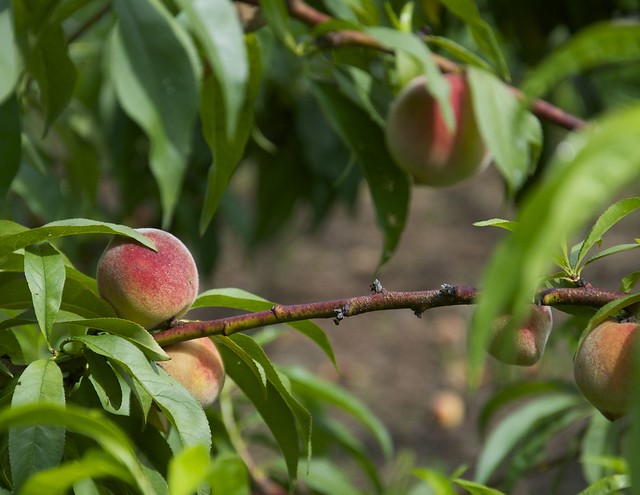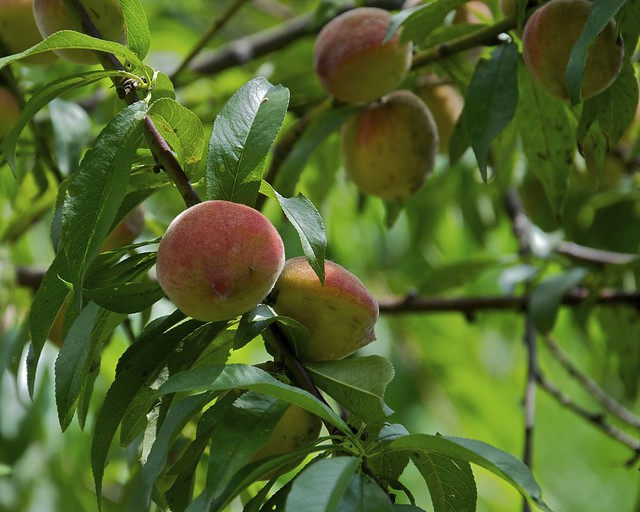Jul 01 2010
The Fruit of One Farmer’s Labor
Last week, I braved the BQE, navigated the Verrazano, and drove to Pittstown, NJ. Sixty miles away and one hundred sixty acres translated to a different world from where I had been a mere hour before. Oak Grove Plantation is an entirely family-run farm that grows an enormous variety of fruits, vegetables, plants, and herbs, in addition to onsite milling and hog operations.
It seems appropriate to begin my article closer to the end of the visit, just as the interview was starting to wind down and before my subsequent farm tour. For the past three hours, Mr. Ted Blew had been sharing stories from his past and present. Yet, if you had happened to walk by the two of us sitting on a picnic table outside of the farmhouse, you would have seen him responding and talking with fresh energy, as if the interview had just begun. Each question or inquiry I had was met with a detailed answer; Mr. Blew’s responses were layered and complicated. (After all, what is simple about farming?) When someone has been a farmer as long as Ted Blew—nearly his entire life—each response involves the synthesis of past experiences and dreams with the present reality of the farm.
One particular answer was so detailed that I enthusiastically exclaimed about what a great story he just shared with me. I had asked him, “which one of your products are you most proud of?” The question is one that I’ve asked every farmer that I’ve interviewed. Mr. Blew’s answer started off not unlike other answers I’ve heard: “Everything!”, he laughed. Then, as is his way, he paused for a few seconds to give the question more serious thought.
Ted Blew’s story starts with him as a high school student and ends with him today, as a farmer. His unwavering commitment to his craft shines through. After you read, I have a feeling you’ll be joining me in line to purchase some of Oak Grove’s peaches!
Well, I know one thing [in particular]. I was in high school and was looking for a job for the summer. I had worked for a farmer down the road and he didn’t need a steady person anymore. So I’m at church in my three-piece suit and in walks this fellow that I knew. He’s on crutches; his leg is all in a cast.
So I said, ''What happened to you?' He goes, 'Oh I flipped my motorcycle – I’m lucky I’m alive.' 'Are you still looking for a job? Do you mind working in an orchard?,'I say 'Anything!' He says, 'They’re desperate for somebody; they need somebody to replace me.'
That same day, still in his three-piece church suit, Ted went to meet with the orchard operator. One of the employer’s first questions was: “Can you drive a stick shift truck?”
Well, my father, when I was a kid, had said, “If you can drive stick, you can drive anything”, so I [answered] “yep”. Then he goes, “can you drive that forklift?” Well, I lied and I said yep! [Next] he says, “are you going to wear those duds today? I could really use you today.” So I said, “just give me a second, this all comes off!” So I took off the coat, took off the tie, the vest, and I still had on my nice pants, but so what?"
The employer proceeded to tell him to use the forklift to put six wood pallets onto a Dodge truck. Ted was instructed to be very careful going across Route 100 and to follow a dirt farm road until he saw some guys picking peaches from twenty-five Blake peach trees. Ted was asked to help them finish picking the peaches and then bring the truck back with the loaded bins. After completing these tasks, he was supposed to come find the employer who would tell him what to do next.
My father had always told me that when you have a strange vehicle, you pull the choke on, tap the throttle three times, and hit the key. When it goes to start, you push the choke off slightly.I did this and it went “varuum”. So all of a sudden, out of the corner of my eye, the [employer] comes running over. He says, “Hey Blewy, how did you learn to do that?” I said, “Do what?” He said, “Start that forklift?! You got the job!” I looked at him and said “I thought I HAD the job?”
Ted was being tested – the employer wanted to see if he could really start the machine. No one who worked there had ever started the forklift on his first try; in fact, it usually took six tries or more. By the time Ted Blew arrived at the orchard, there were two trees left to be picked. Each picker was equipped with a cloth lined metal bin, complete with straps in the front, leaving both hands free to pick. They leaned into the bin when they had a full hopper and the cloth allowed the fruit to fall in without getting damaged.
I walk up to the tree and grab a Blake peach and when I start to squeeze. I can feel the juice dripping down. I finally get a hold of the peach and pull it off the tree. The [peach] pit stays on the tree. [One] guy looks at me and goes, “So what are you going to do with that? You either eat it or chuck it.”
It was the best peach I’d ever had in my entire life. So I ate another peach and another peach. I swore from that day on that if I ever had a farm, I’d have a peach orchard. So in 1996, I decided to start a peach orchard.
That year Ted consulted a tree fruit specialist, explaining that he wanted to grow peaches organically. The specialist explained that it wasn’t possible to grow peaches organically. Ted responded that he was going to try regardless, telling him that he could be “the first guy to say ‘I told you so’”. When Ted started asking the specialist questions about varieties and taste, it became apparent that no one had done much research or even growing based around the taste of a peach. Ted was shocked! Ted wanted customers to come back and “thirst for my peaches – my peaches over everyone else’s peaches.”
The fruit tree specialist told Ted to prep the ground for three years in a row, with cover crops. Meanwhile, Ted spent his time researching peaches. He would go around the farmers’ market and buy peaches from every farmer who sold them, insisting on only buying peaches that the farmers knew the name of. He’d make sure to buy enough peaches for his family, and each family member would privately record their reactions on a spreadsheet, making sure to note the season of each peach.
We now have about 50 varieties of peaches that do excellent[ly]. We even planted a special grass in the orchard that doesn’t compete with the peach trees. It was like a research project, a thesis.
Due to his success with growing peaches organically, Ted was recently approached to speak as a stone fruits expert at the upcoming Northeast Organic Farming Association (NOFA) conference. Ted spoke of this invitation with a great amount of pride and is currently considering speaking at the conference.
Throughout the next week, I’ll be adding more posts about my fascinating interview with Ted Blew, as well as additional details and pictures about Oak Grove Plantation.
Oak Grove Plantation’s peaches are available right now! Oak Grove is at Union Square Greenmarket on Wednesdays, Fridays, and Saturdays. Stop by soon and enjoy the literal fruits of the Blew family’s research!
This piece is cross-posted at The Fresh Blog
